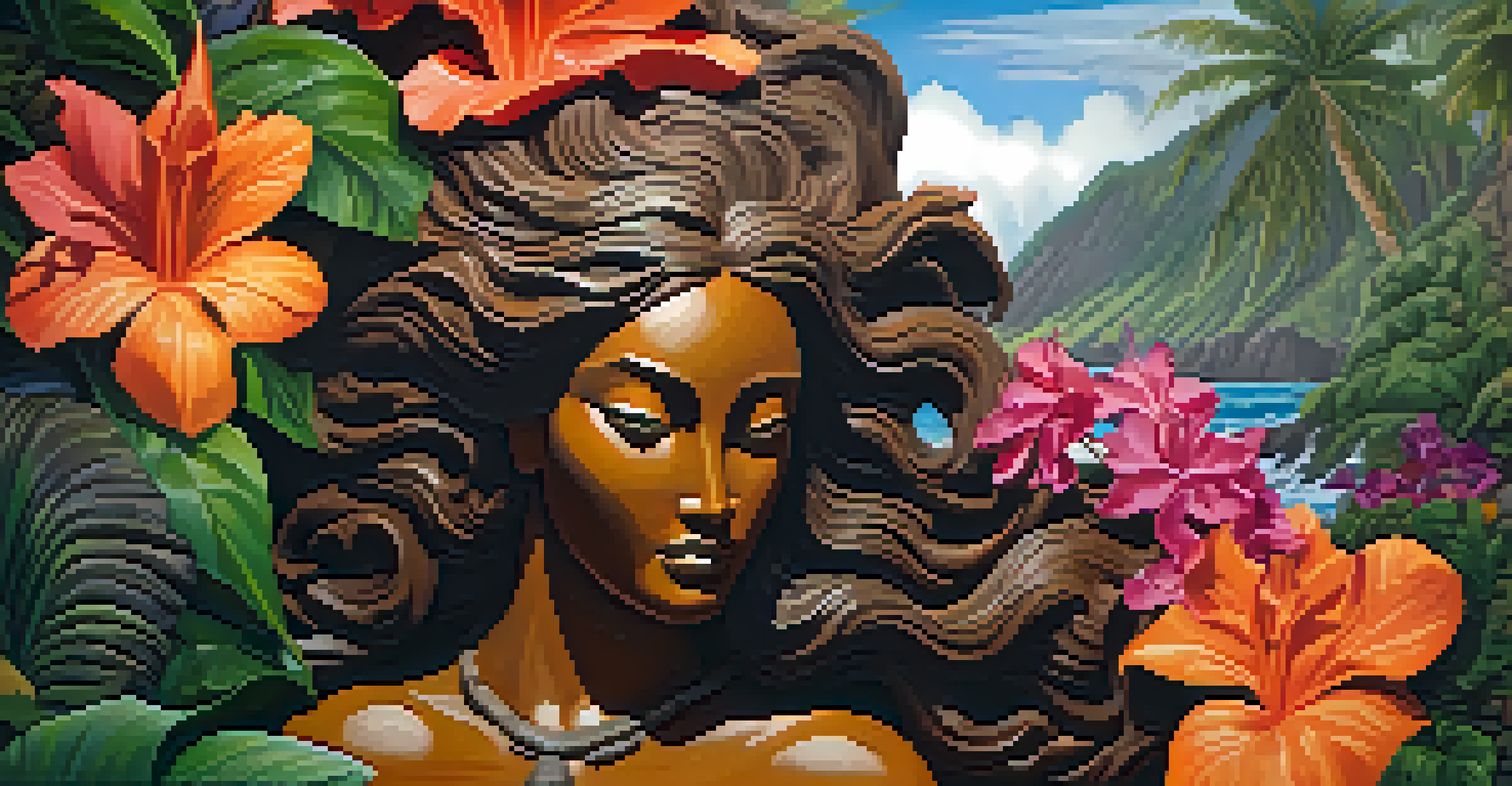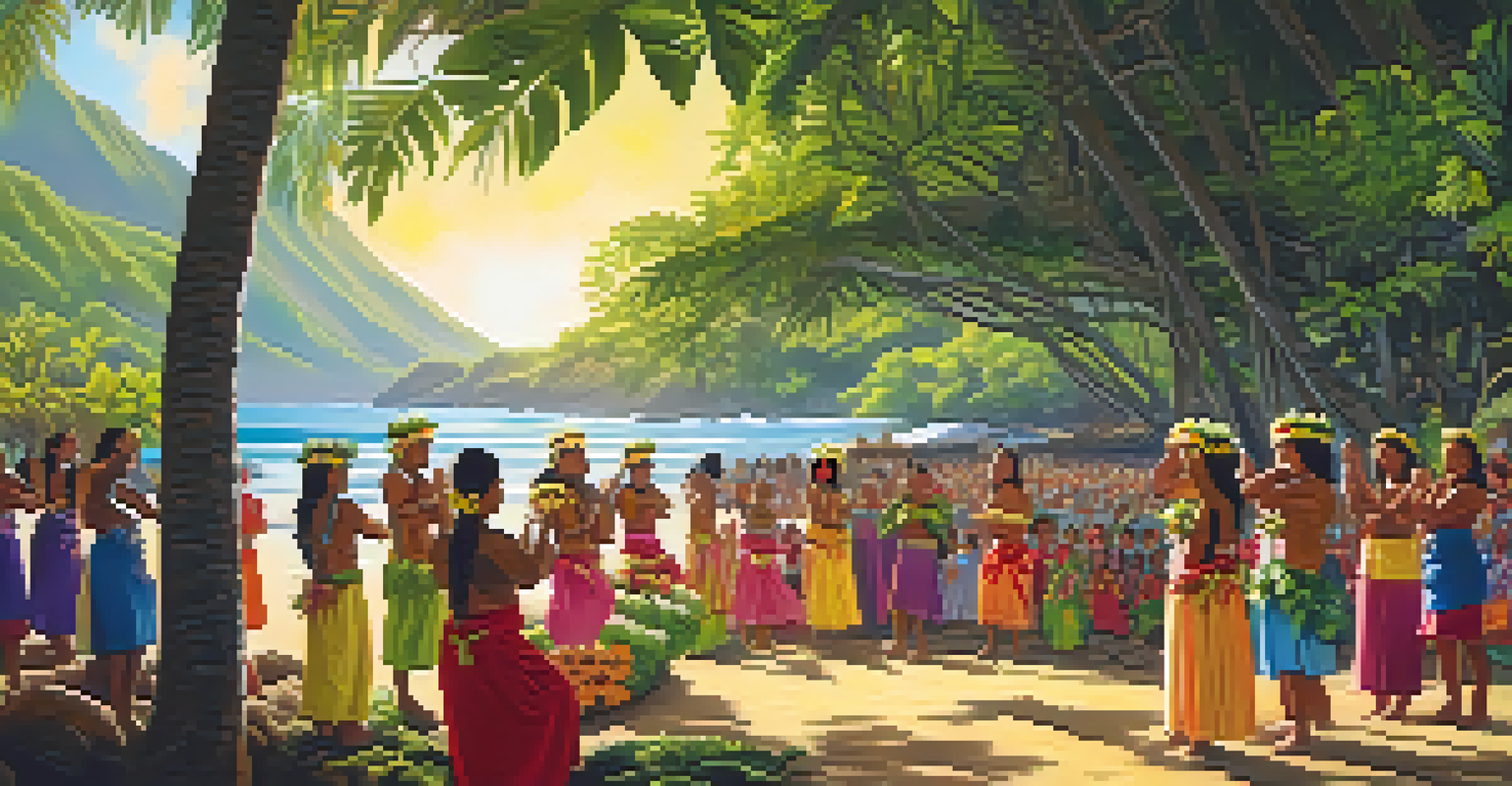Ancient Hawaiian Gods: A Study of Hawaiian Deities

Understanding Hawaiian Mythology and Its Importance
Hawaiian mythology is a vibrant tapestry woven from the threads of ancient beliefs and practices. It reflects the culture, values, and history of the Hawaiian people, showcasing their deep connection to nature and the universe. Myths were not just stories; they served as guides for moral behavior and offered explanations for natural phenomena.
Myth is a way of making sense of the world, of finding meaning in the chaos of existence.
In this rich tradition, gods and goddesses played pivotal roles, embodying various aspects of life, from creation to agriculture. These deities were believed to influence everything from the weather to human fate, emphasizing the Hawaiians' respect for both the seen and unseen forces of the world. By studying these myths, we gain insight into the values and priorities of ancient Hawaiian society.
Moreover, these myths fostered a sense of community and identity among the people. They were shared through oral traditions and rituals, creating a collective memory that bonded generations together. Understanding these stories today allows us to appreciate not just the spiritual beliefs of the past, but also their lasting impact on contemporary Hawaiian culture.
Key Hawaiian Deities: The Major Figures
The Hawaiian pantheon includes a variety of deities, each with unique attributes and stories. One of the most revered is Ku, the god of war and governance, who symbolizes strength and authority. His presence was crucial in ancient battles, and he was often invoked by leaders seeking victory and protection.

Another significant figure is Pele, the goddess of fire and volcanoes, known for her fierce temperament and creative power. She embodies the transformative forces of nature, reminding us that destruction can lead to renewal. Stories of Pele’s adventures and conflicts highlight the importance of respecting nature's power and unpredictability.
Hawaiian Myths Reflect Cultural Values
Hawaiian mythology serves as a vital reflection of the culture, values, and historical connection the Hawaiian people have with nature and the universe.
Additionally, there’s Lono, the god of agriculture and fertility, who represents abundance and growth. His festivals celebrated the harvest and the changing seasons, showcasing the agricultural practices that were vital for survival in ancient Hawaii. Each of these deities plays a role in the interconnectedness of life, nature, and spirituality in Hawaiian culture.
Creation Myths: The Birth of the Hawaiian Islands
Creation myths are fundamental to understanding Hawaiian spirituality and history. One popular story involves the goddess Hoʻohokukalani, who is said to have given birth to the islands through a cosmic union with the god Wākea. This narrative illustrates the sacred relationship between the land and its people, emphasizing the belief that the islands are living entities.
We do not inherit the earth from our ancestors, we borrow it from our children.
These myths often depict the islands as extensions of the gods themselves, reinforcing the idea that the land is sacred. This belief is why many Hawaiians feel a deep responsibility to care for their environment, seeing it as a reflection of their ancestors and deities. The reverence for the land continues to be a cornerstone of Hawaiian culture today.
Moreover, these creation stories are not just tales of the past; they serve as reminders of the interconnectedness of life. By understanding these myths, we can appreciate the Hawaiian worldview, which sees humanity as part of a larger ecosystem, where every element is valuable and worthy of respect.
The Role of Ancestors in Hawaiian Religion
In Hawaiian culture, ancestors hold a revered place alongside the gods. The concept of 'aumakua refers to ancestral spirits that guide and protect their descendants. These spirits often take the form of animals, plants, or natural elements, symbolizing the ongoing connection between the living and the deceased.
Family lineage and genealogy are crucial in Hawaiian spirituality. Ancestors are believed to influence the lives of their descendants, providing wisdom and support from the spiritual realm. This lineage ties individuals to their community and history, reinforcing the idea that one’s identity is intertwined with the past.
Deities Influence Hawaiian Life
The pantheon of Hawaiian deities, such as Ku, Pele, and Lono, plays a crucial role in society, embodying values like strength, respect for nature, and the importance of agriculture.
Rituals and practices dedicated to honoring ancestors are integral to Hawaiian life. From family gatherings to specific ceremonies, these traditions ensure that the legacy of ancestors is preserved and respected. This deep respect for the past fosters a sense of continuity and belonging within the Hawaiian community.
Rituals and Ceremonies: Honoring the Deities
Rituals and ceremonies were vital in ancient Hawaiian society, serving as expressions of devotion to the gods. These practices varied from simple offerings to elaborate festivals, each designed to invoke the favor of the deities. For example, hula, a traditional dance, was often performed to honor gods like Lono and Pele, blending storytelling with movement.
These ceremonies were not just acts of worship; they were also communal events that strengthened social bonds. People came together to participate, creating a sense of unity and shared purpose. This collective aspect of rituals highlights the importance of community in Hawaiian spirituality, where individual and collective well-being are interconnected.
Additionally, rituals often reflected the changing seasons and agricultural cycles, underscoring the Hawaiians' close relationship with nature. By aligning their practices with natural rhythms, they demonstrated a profound respect for the environment. Today, many of these rituals continue, evolving but still rooted in the ancient traditions that honor the gods and the land.
Modern Interpretations of Hawaiian Deities
As Hawaii has evolved, so too has the interpretation of its ancient gods. Today, many Hawaiians are rediscovering and revitalizing their ancestral beliefs, finding relevance in the teachings of old. This resurgence is often seen in cultural festivals and educational programs that celebrate Hawaiian mythology and its importance in contemporary life.
Modern interpretations also reflect the blending of traditional beliefs with contemporary values. For instance, the themes of environmental stewardship and sustainability resonate strongly with the teachings of ancient deities, making them relevant in today’s discussions about climate change and conservation. This adaptation illustrates how ancient wisdom can inform modern practices.
Modern Relevance of Ancient Beliefs
Contemporary interpretations of Hawaiian deities highlight their ongoing importance in discussions about environmental stewardship and cultural identity.
Furthermore, the global interest in Hawaiian culture has brought attention to these deities, leading to a broader appreciation of their significance. Through art, literature, and tourism, Hawaiian gods are being celebrated, creating a dialogue between the past and present. This renewed interest not only honors the deities but also helps preserve the rich cultural heritage of Hawaii.
The Legacy of Hawaiian Deities in Contemporary Culture
The legacy of ancient Hawaiian gods extends beyond mythology; it permeates contemporary Hawaiian culture. From popular media to local arts, the stories of these deities continue to inspire creativity and expression. Artists often draw upon the rich imagery and symbolism associated with these gods, bringing ancient narratives into modern contexts.
Moreover, the values embodied by these deities—such as respect for nature, community, and resilience—remain relevant today. Hawaiians often invoke these principles in discussions about identity, environmentalism, and social justice, demonstrating how ancient beliefs can guide contemporary action. This connection to the past fosters a sense of pride and authenticity within the community.

Finally, the ongoing celebration of Hawaiian culture, through festivals and educational initiatives, ensures that the stories of these deities are passed down through generations. By keeping these traditions alive, the Hawaiian people honor their heritage and maintain a vibrant cultural identity in an ever-changing world. The ancient gods of Hawaii remain a vital part of the island's narrative, linking past, present, and future.